Sustainable Tourism and Development
VerifiedAdded on 2023/06/15
|9
|2040
|418
AI Summary
This reflective report discusses sustainable operations and development, responsible consumption, and the role of education and culture in sustainable practices. The report explores the interconnection between environment and sustainable development through the case study of Uganda. The report emphasizes the importance of embracing wildlife conservation and ecotourism essential for the promotion of tourism activities in the place that would develop their economy. The report also highlights the importance of responsible consumption where eco-tourists would not deplete the resources of host country. The report concludes that sustainable development cannot progress without responsible consumer behavior and corporate social responsibility.
Contribute Materials
Your contribution can guide someone’s learning journey. Share your
documents today.
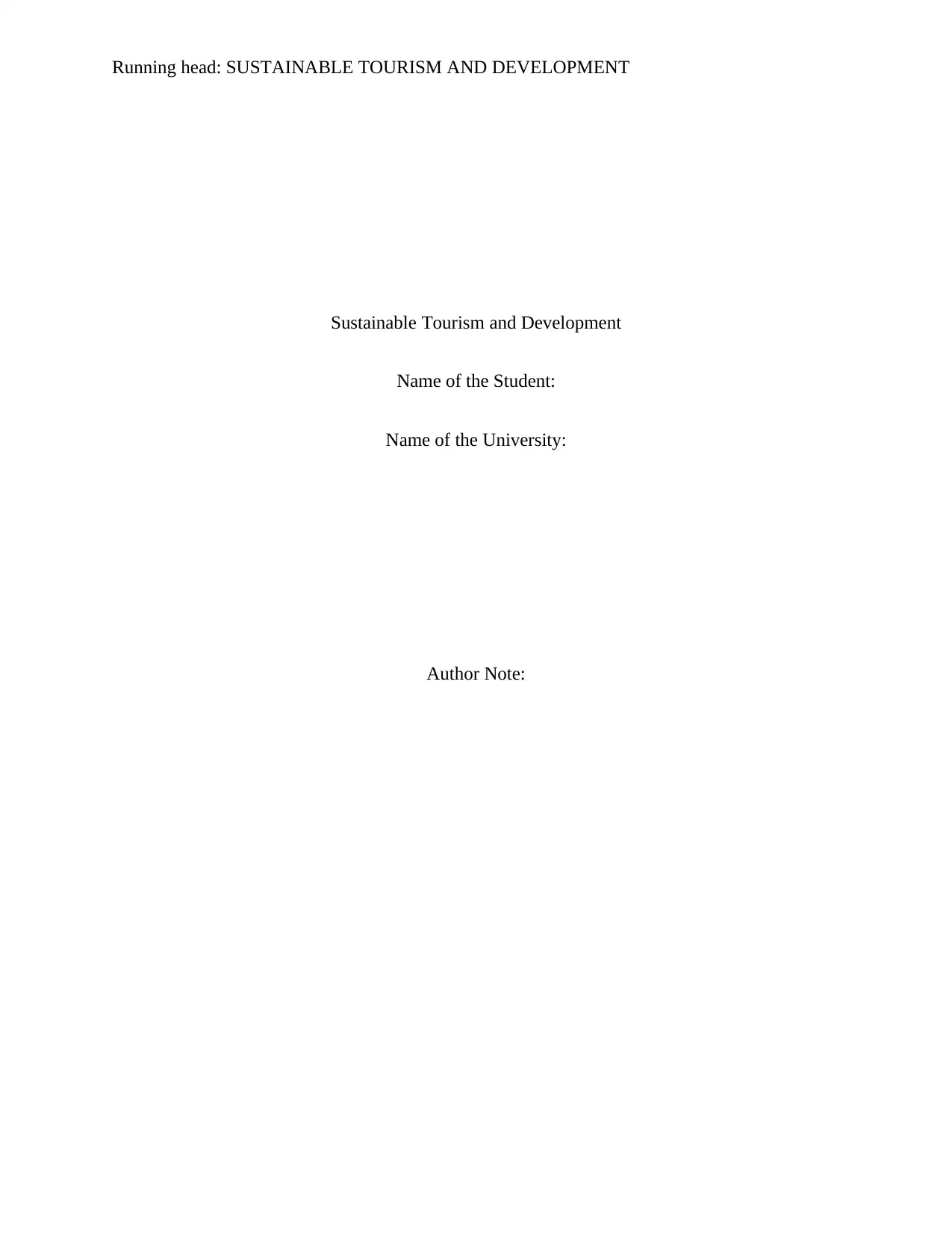
Running head: SUSTAINABLE TOURISM AND DEVELOPMENT
Sustainable Tourism and Development
Name of the Student:
Name of the University:
Author Note:
Sustainable Tourism and Development
Name of the Student:
Name of the University:
Author Note:
Secure Best Marks with AI Grader
Need help grading? Try our AI Grader for instant feedback on your assignments.
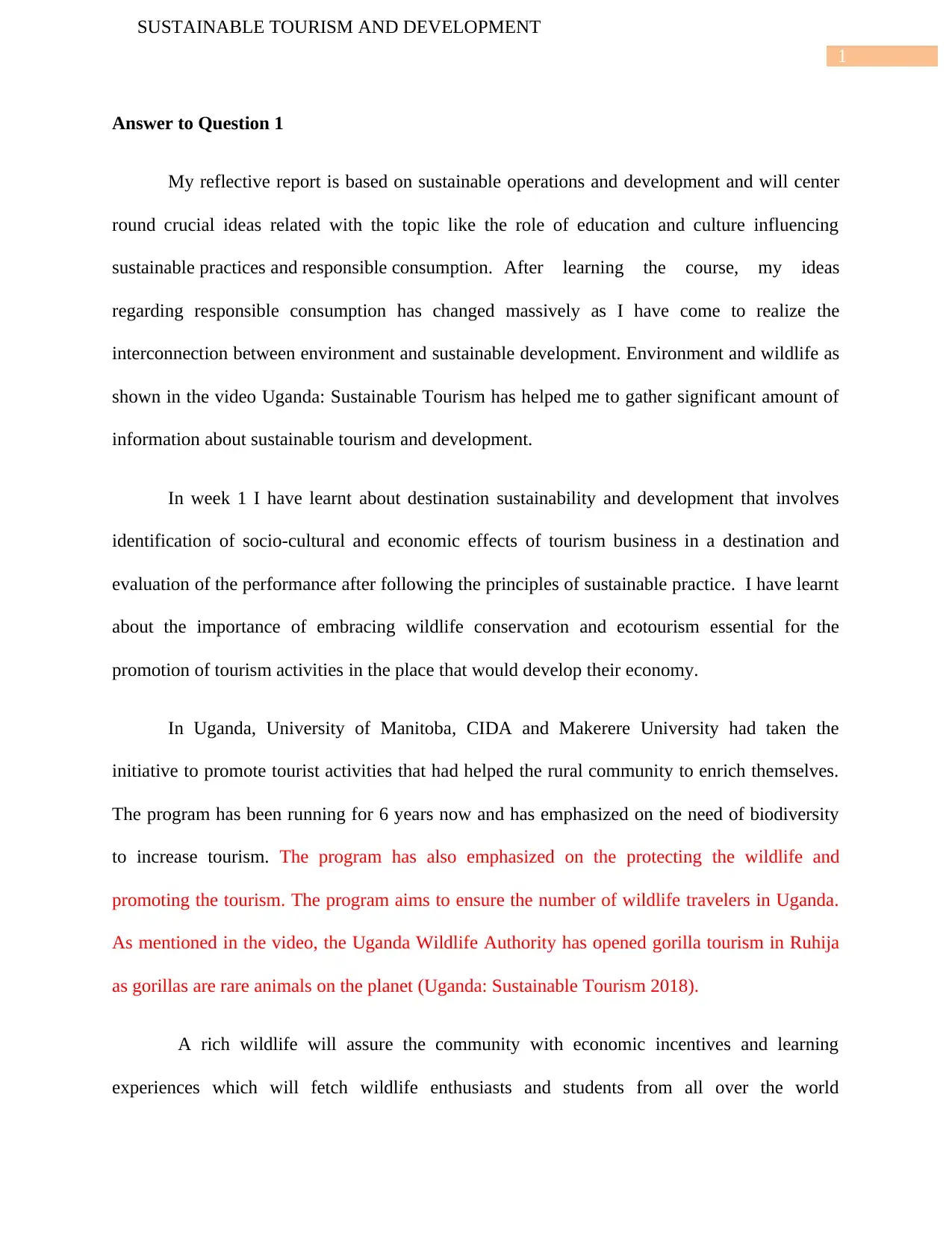
1
SUSTAINABLE TOURISM AND DEVELOPMENT
Answer to Question 1
My reflective report is based on sustainable operations and development and will center
round crucial ideas related with the topic like the role of education and culture influencing
sustainable practices and responsible consumption. After learning the course, my ideas
regarding responsible consumption has changed massively as I have come to realize the
interconnection between environment and sustainable development. Environment and wildlife as
shown in the video Uganda: Sustainable Tourism has helped me to gather significant amount of
information about sustainable tourism and development.
In week 1 I have learnt about destination sustainability and development that involves
identification of socio-cultural and economic effects of tourism business in a destination and
evaluation of the performance after following the principles of sustainable practice. I have learnt
about the importance of embracing wildlife conservation and ecotourism essential for the
promotion of tourism activities in the place that would develop their economy.
In Uganda, University of Manitoba, CIDA and Makerere University had taken the
initiative to promote tourist activities that had helped the rural community to enrich themselves.
The program has been running for 6 years now and has emphasized on the need of biodiversity
to increase tourism. The program has also emphasized on the protecting the wildlife and
promoting the tourism. The program aims to ensure the number of wildlife travelers in Uganda.
As mentioned in the video, the Uganda Wildlife Authority has opened gorilla tourism in Ruhija
as gorillas are rare animals on the planet (Uganda: Sustainable Tourism 2018).
A rich wildlife will assure the community with economic incentives and learning
experiences which will fetch wildlife enthusiasts and students from all over the world
SUSTAINABLE TOURISM AND DEVELOPMENT
Answer to Question 1
My reflective report is based on sustainable operations and development and will center
round crucial ideas related with the topic like the role of education and culture influencing
sustainable practices and responsible consumption. After learning the course, my ideas
regarding responsible consumption has changed massively as I have come to realize the
interconnection between environment and sustainable development. Environment and wildlife as
shown in the video Uganda: Sustainable Tourism has helped me to gather significant amount of
information about sustainable tourism and development.
In week 1 I have learnt about destination sustainability and development that involves
identification of socio-cultural and economic effects of tourism business in a destination and
evaluation of the performance after following the principles of sustainable practice. I have learnt
about the importance of embracing wildlife conservation and ecotourism essential for the
promotion of tourism activities in the place that would develop their economy.
In Uganda, University of Manitoba, CIDA and Makerere University had taken the
initiative to promote tourist activities that had helped the rural community to enrich themselves.
The program has been running for 6 years now and has emphasized on the need of biodiversity
to increase tourism. The program has also emphasized on the protecting the wildlife and
promoting the tourism. The program aims to ensure the number of wildlife travelers in Uganda.
As mentioned in the video, the Uganda Wildlife Authority has opened gorilla tourism in Ruhija
as gorillas are rare animals on the planet (Uganda: Sustainable Tourism 2018).
A rich wildlife will assure the community with economic incentives and learning
experiences which will fetch wildlife enthusiasts and students from all over the world
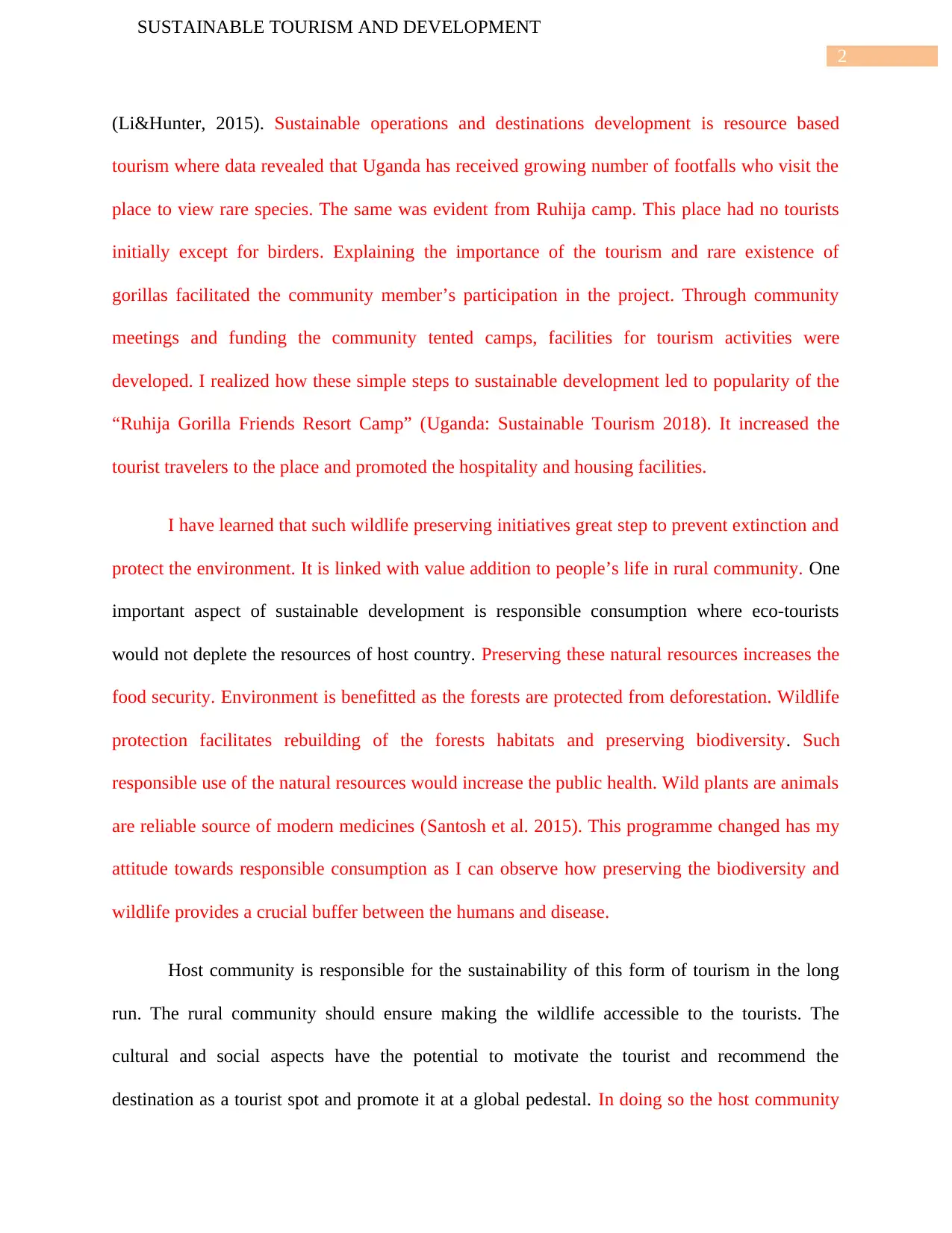
2
SUSTAINABLE TOURISM AND DEVELOPMENT
(Li&Hunter, 2015). Sustainable operations and destinations development is resource based
tourism where data revealed that Uganda has received growing number of footfalls who visit the
place to view rare species. The same was evident from Ruhija camp. This place had no tourists
initially except for birders. Explaining the importance of the tourism and rare existence of
gorillas facilitated the community member’s participation in the project. Through community
meetings and funding the community tented camps, facilities for tourism activities were
developed. I realized how these simple steps to sustainable development led to popularity of the
“Ruhija Gorilla Friends Resort Camp” (Uganda: Sustainable Tourism 2018). It increased the
tourist travelers to the place and promoted the hospitality and housing facilities.
I have learned that such wildlife preserving initiatives great step to prevent extinction and
protect the environment. It is linked with value addition to people’s life in rural community. One
important aspect of sustainable development is responsible consumption where eco-tourists
would not deplete the resources of host country. Preserving these natural resources increases the
food security. Environment is benefitted as the forests are protected from deforestation. Wildlife
protection facilitates rebuilding of the forests habitats and preserving biodiversity. Such
responsible use of the natural resources would increase the public health. Wild plants are animals
are reliable source of modern medicines (Santosh et al. 2015). This programme changed has my
attitude towards responsible consumption as I can observe how preserving the biodiversity and
wildlife provides a crucial buffer between the humans and disease.
Host community is responsible for the sustainability of this form of tourism in the long
run. The rural community should ensure making the wildlife accessible to the tourists. The
cultural and social aspects have the potential to motivate the tourist and recommend the
destination as a tourist spot and promote it at a global pedestal. In doing so the host community
SUSTAINABLE TOURISM AND DEVELOPMENT
(Li&Hunter, 2015). Sustainable operations and destinations development is resource based
tourism where data revealed that Uganda has received growing number of footfalls who visit the
place to view rare species. The same was evident from Ruhija camp. This place had no tourists
initially except for birders. Explaining the importance of the tourism and rare existence of
gorillas facilitated the community member’s participation in the project. Through community
meetings and funding the community tented camps, facilities for tourism activities were
developed. I realized how these simple steps to sustainable development led to popularity of the
“Ruhija Gorilla Friends Resort Camp” (Uganda: Sustainable Tourism 2018). It increased the
tourist travelers to the place and promoted the hospitality and housing facilities.
I have learned that such wildlife preserving initiatives great step to prevent extinction and
protect the environment. It is linked with value addition to people’s life in rural community. One
important aspect of sustainable development is responsible consumption where eco-tourists
would not deplete the resources of host country. Preserving these natural resources increases the
food security. Environment is benefitted as the forests are protected from deforestation. Wildlife
protection facilitates rebuilding of the forests habitats and preserving biodiversity. Such
responsible use of the natural resources would increase the public health. Wild plants are animals
are reliable source of modern medicines (Santosh et al. 2015). This programme changed has my
attitude towards responsible consumption as I can observe how preserving the biodiversity and
wildlife provides a crucial buffer between the humans and disease.
Host community is responsible for the sustainability of this form of tourism in the long
run. The rural community should ensure making the wildlife accessible to the tourists. The
cultural and social aspects have the potential to motivate the tourist and recommend the
destination as a tourist spot and promote it at a global pedestal. In doing so the host community
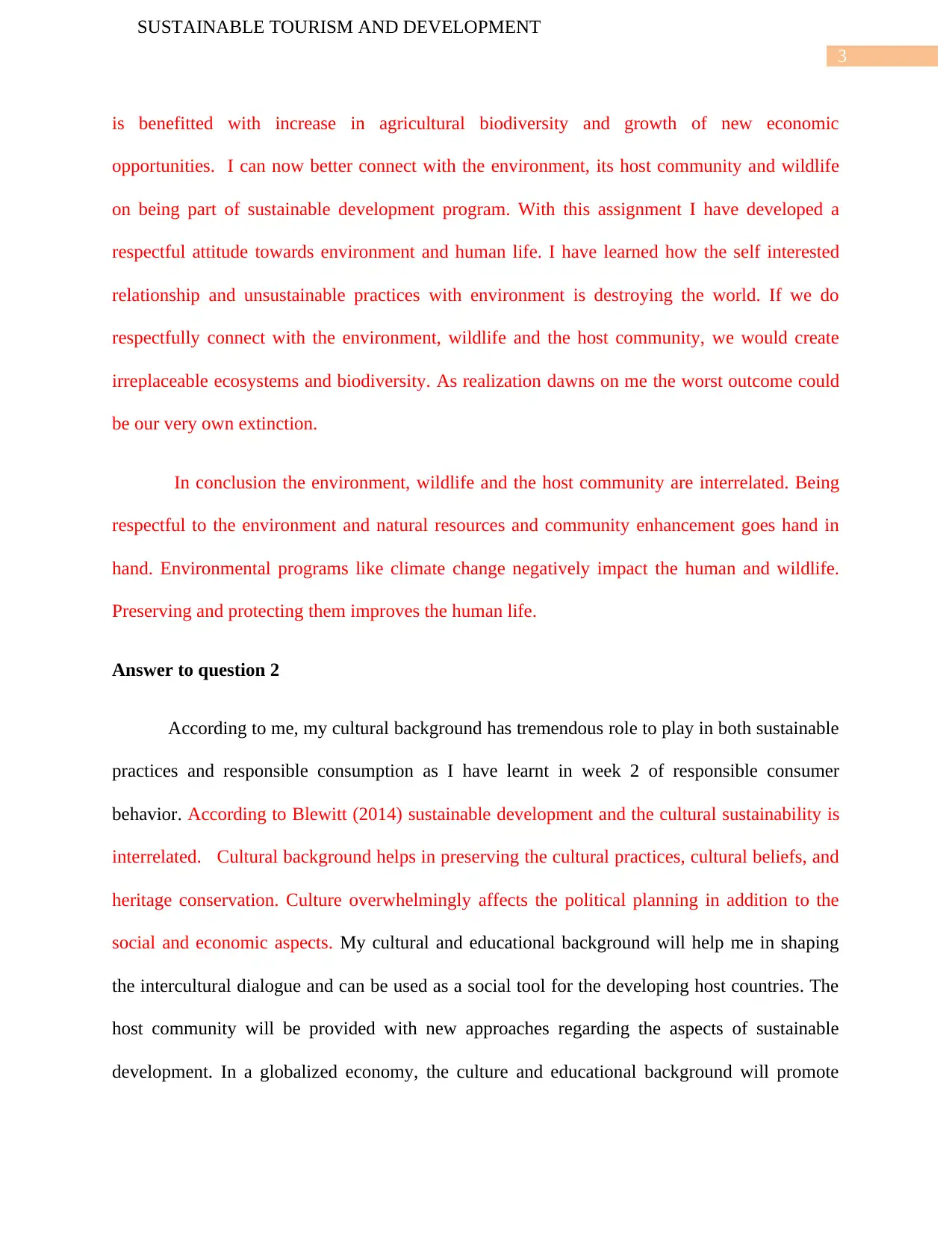
3
SUSTAINABLE TOURISM AND DEVELOPMENT
is benefitted with increase in agricultural biodiversity and growth of new economic
opportunities. I can now better connect with the environment, its host community and wildlife
on being part of sustainable development program. With this assignment I have developed a
respectful attitude towards environment and human life. I have learned how the self interested
relationship and unsustainable practices with environment is destroying the world. If we do
respectfully connect with the environment, wildlife and the host community, we would create
irreplaceable ecosystems and biodiversity. As realization dawns on me the worst outcome could
be our very own extinction.
In conclusion the environment, wildlife and the host community are interrelated. Being
respectful to the environment and natural resources and community enhancement goes hand in
hand. Environmental programs like climate change negatively impact the human and wildlife.
Preserving and protecting them improves the human life.
Answer to question 2
According to me, my cultural background has tremendous role to play in both sustainable
practices and responsible consumption as I have learnt in week 2 of responsible consumer
behavior. According to Blewitt (2014) sustainable development and the cultural sustainability is
interrelated. Cultural background helps in preserving the cultural practices, cultural beliefs, and
heritage conservation. Culture overwhelmingly affects the political planning in addition to the
social and economic aspects. My cultural and educational background will help me in shaping
the intercultural dialogue and can be used as a social tool for the developing host countries. The
host community will be provided with new approaches regarding the aspects of sustainable
development. In a globalized economy, the culture and educational background will promote
SUSTAINABLE TOURISM AND DEVELOPMENT
is benefitted with increase in agricultural biodiversity and growth of new economic
opportunities. I can now better connect with the environment, its host community and wildlife
on being part of sustainable development program. With this assignment I have developed a
respectful attitude towards environment and human life. I have learned how the self interested
relationship and unsustainable practices with environment is destroying the world. If we do
respectfully connect with the environment, wildlife and the host community, we would create
irreplaceable ecosystems and biodiversity. As realization dawns on me the worst outcome could
be our very own extinction.
In conclusion the environment, wildlife and the host community are interrelated. Being
respectful to the environment and natural resources and community enhancement goes hand in
hand. Environmental programs like climate change negatively impact the human and wildlife.
Preserving and protecting them improves the human life.
Answer to question 2
According to me, my cultural background has tremendous role to play in both sustainable
practices and responsible consumption as I have learnt in week 2 of responsible consumer
behavior. According to Blewitt (2014) sustainable development and the cultural sustainability is
interrelated. Cultural background helps in preserving the cultural practices, cultural beliefs, and
heritage conservation. Culture overwhelmingly affects the political planning in addition to the
social and economic aspects. My cultural and educational background will help me in shaping
the intercultural dialogue and can be used as a social tool for the developing host countries. The
host community will be provided with new approaches regarding the aspects of sustainable
development. In a globalized economy, the culture and educational background will promote
Secure Best Marks with AI Grader
Need help grading? Try our AI Grader for instant feedback on your assignments.
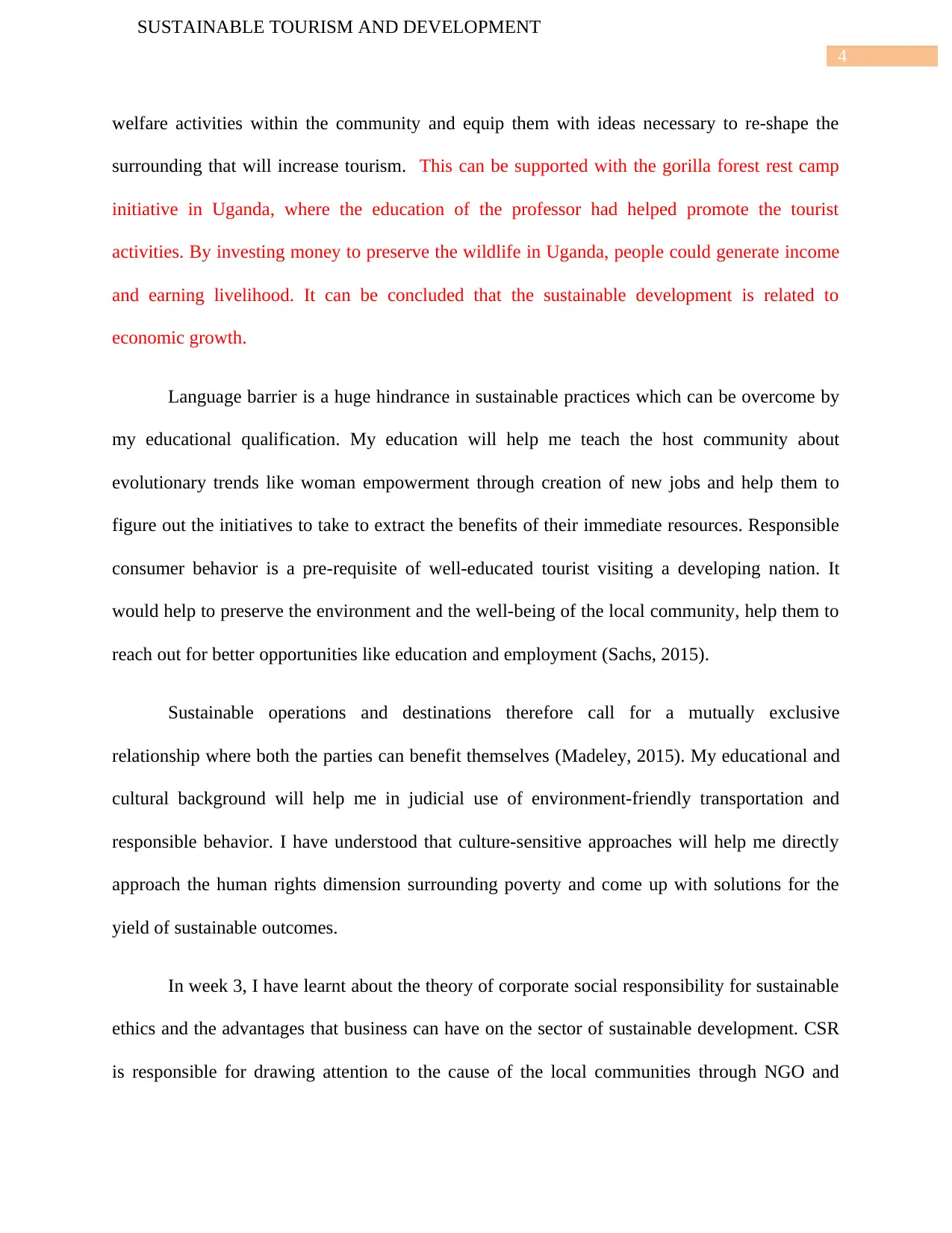
4
SUSTAINABLE TOURISM AND DEVELOPMENT
welfare activities within the community and equip them with ideas necessary to re-shape the
surrounding that will increase tourism. This can be supported with the gorilla forest rest camp
initiative in Uganda, where the education of the professor had helped promote the tourist
activities. By investing money to preserve the wildlife in Uganda, people could generate income
and earning livelihood. It can be concluded that the sustainable development is related to
economic growth.
Language barrier is a huge hindrance in sustainable practices which can be overcome by
my educational qualification. My education will help me teach the host community about
evolutionary trends like woman empowerment through creation of new jobs and help them to
figure out the initiatives to take to extract the benefits of their immediate resources. Responsible
consumer behavior is a pre-requisite of well-educated tourist visiting a developing nation. It
would help to preserve the environment and the well-being of the local community, help them to
reach out for better opportunities like education and employment (Sachs, 2015).
Sustainable operations and destinations therefore call for a mutually exclusive
relationship where both the parties can benefit themselves (Madeley, 2015). My educational and
cultural background will help me in judicial use of environment-friendly transportation and
responsible behavior. I have understood that culture-sensitive approaches will help me directly
approach the human rights dimension surrounding poverty and come up with solutions for the
yield of sustainable outcomes.
In week 3, I have learnt about the theory of corporate social responsibility for sustainable
ethics and the advantages that business can have on the sector of sustainable development. CSR
is responsible for drawing attention to the cause of the local communities through NGO and
SUSTAINABLE TOURISM AND DEVELOPMENT
welfare activities within the community and equip them with ideas necessary to re-shape the
surrounding that will increase tourism. This can be supported with the gorilla forest rest camp
initiative in Uganda, where the education of the professor had helped promote the tourist
activities. By investing money to preserve the wildlife in Uganda, people could generate income
and earning livelihood. It can be concluded that the sustainable development is related to
economic growth.
Language barrier is a huge hindrance in sustainable practices which can be overcome by
my educational qualification. My education will help me teach the host community about
evolutionary trends like woman empowerment through creation of new jobs and help them to
figure out the initiatives to take to extract the benefits of their immediate resources. Responsible
consumer behavior is a pre-requisite of well-educated tourist visiting a developing nation. It
would help to preserve the environment and the well-being of the local community, help them to
reach out for better opportunities like education and employment (Sachs, 2015).
Sustainable operations and destinations therefore call for a mutually exclusive
relationship where both the parties can benefit themselves (Madeley, 2015). My educational and
cultural background will help me in judicial use of environment-friendly transportation and
responsible behavior. I have understood that culture-sensitive approaches will help me directly
approach the human rights dimension surrounding poverty and come up with solutions for the
yield of sustainable outcomes.
In week 3, I have learnt about the theory of corporate social responsibility for sustainable
ethics and the advantages that business can have on the sector of sustainable development. CSR
is responsible for drawing attention to the cause of the local communities through NGO and
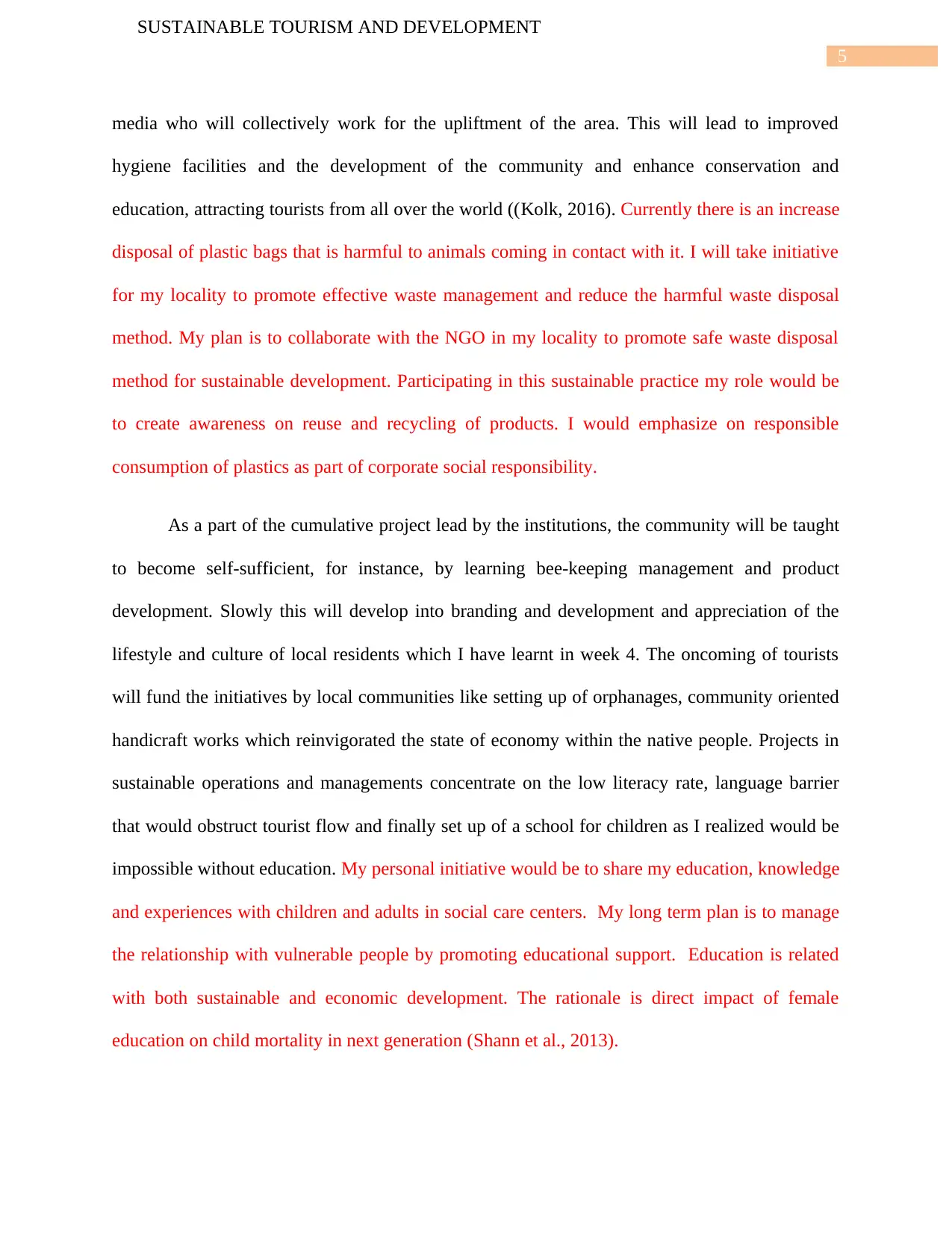
5
SUSTAINABLE TOURISM AND DEVELOPMENT
media who will collectively work for the upliftment of the area. This will lead to improved
hygiene facilities and the development of the community and enhance conservation and
education, attracting tourists from all over the world ((Kolk, 2016). Currently there is an increase
disposal of plastic bags that is harmful to animals coming in contact with it. I will take initiative
for my locality to promote effective waste management and reduce the harmful waste disposal
method. My plan is to collaborate with the NGO in my locality to promote safe waste disposal
method for sustainable development. Participating in this sustainable practice my role would be
to create awareness on reuse and recycling of products. I would emphasize on responsible
consumption of plastics as part of corporate social responsibility.
As a part of the cumulative project lead by the institutions, the community will be taught
to become self-sufficient, for instance, by learning bee-keeping management and product
development. Slowly this will develop into branding and development and appreciation of the
lifestyle and culture of local residents which I have learnt in week 4. The oncoming of tourists
will fund the initiatives by local communities like setting up of orphanages, community oriented
handicraft works which reinvigorated the state of economy within the native people. Projects in
sustainable operations and managements concentrate on the low literacy rate, language barrier
that would obstruct tourist flow and finally set up of a school for children as I realized would be
impossible without education. My personal initiative would be to share my education, knowledge
and experiences with children and adults in social care centers. My long term plan is to manage
the relationship with vulnerable people by promoting educational support. Education is related
with both sustainable and economic development. The rationale is direct impact of female
education on child mortality in next generation (Shann et al., 2013).
SUSTAINABLE TOURISM AND DEVELOPMENT
media who will collectively work for the upliftment of the area. This will lead to improved
hygiene facilities and the development of the community and enhance conservation and
education, attracting tourists from all over the world ((Kolk, 2016). Currently there is an increase
disposal of plastic bags that is harmful to animals coming in contact with it. I will take initiative
for my locality to promote effective waste management and reduce the harmful waste disposal
method. My plan is to collaborate with the NGO in my locality to promote safe waste disposal
method for sustainable development. Participating in this sustainable practice my role would be
to create awareness on reuse and recycling of products. I would emphasize on responsible
consumption of plastics as part of corporate social responsibility.
As a part of the cumulative project lead by the institutions, the community will be taught
to become self-sufficient, for instance, by learning bee-keeping management and product
development. Slowly this will develop into branding and development and appreciation of the
lifestyle and culture of local residents which I have learnt in week 4. The oncoming of tourists
will fund the initiatives by local communities like setting up of orphanages, community oriented
handicraft works which reinvigorated the state of economy within the native people. Projects in
sustainable operations and managements concentrate on the low literacy rate, language barrier
that would obstruct tourist flow and finally set up of a school for children as I realized would be
impossible without education. My personal initiative would be to share my education, knowledge
and experiences with children and adults in social care centers. My long term plan is to manage
the relationship with vulnerable people by promoting educational support. Education is related
with both sustainable and economic development. The rationale is direct impact of female
education on child mortality in next generation (Shann et al., 2013).
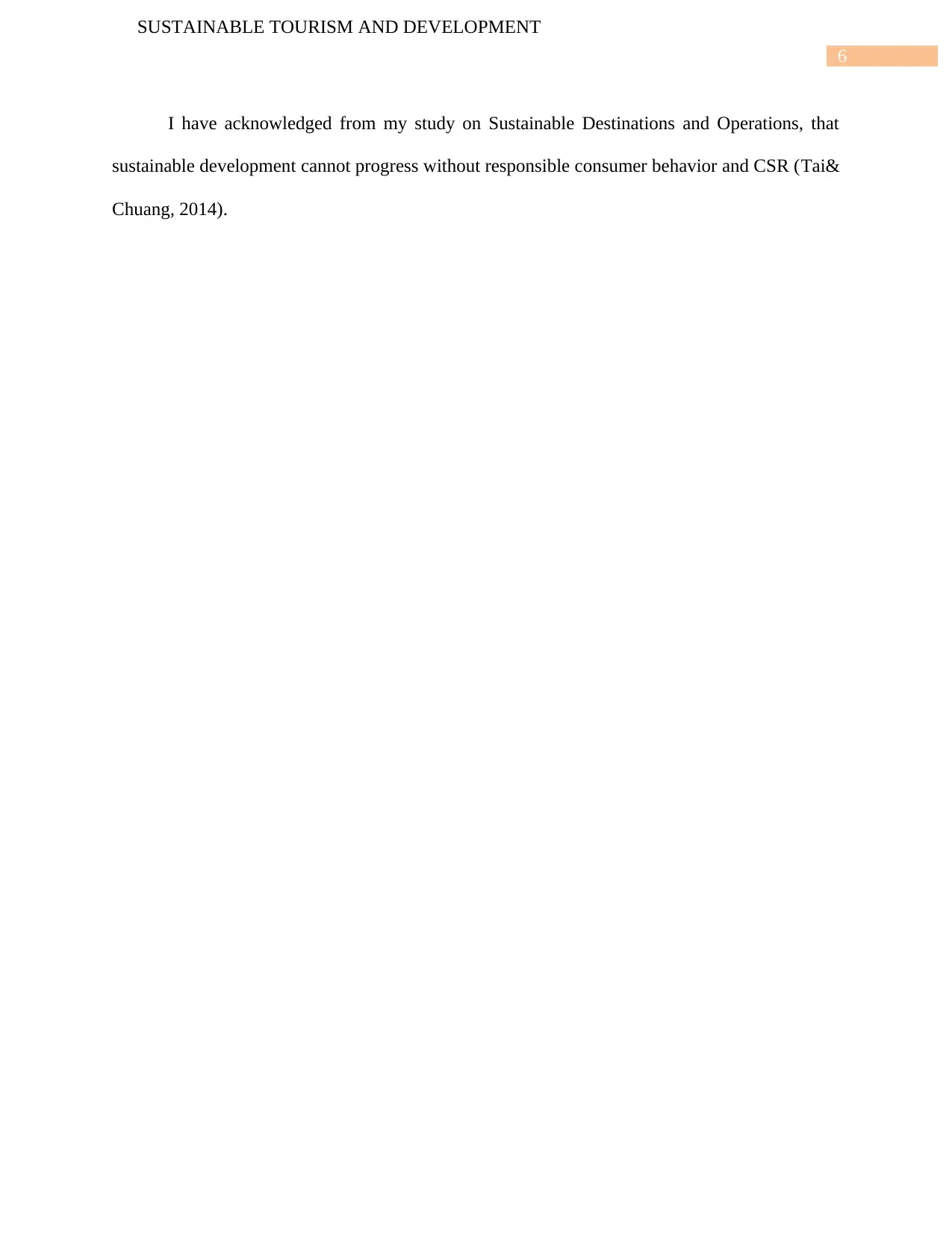
6
SUSTAINABLE TOURISM AND DEVELOPMENT
I have acknowledged from my study on Sustainable Destinations and Operations, that
sustainable development cannot progress without responsible consumer behavior and CSR (Tai&
Chuang, 2014).
SUSTAINABLE TOURISM AND DEVELOPMENT
I have acknowledged from my study on Sustainable Destinations and Operations, that
sustainable development cannot progress without responsible consumer behavior and CSR (Tai&
Chuang, 2014).
Paraphrase This Document
Need a fresh take? Get an instant paraphrase of this document with our AI Paraphraser
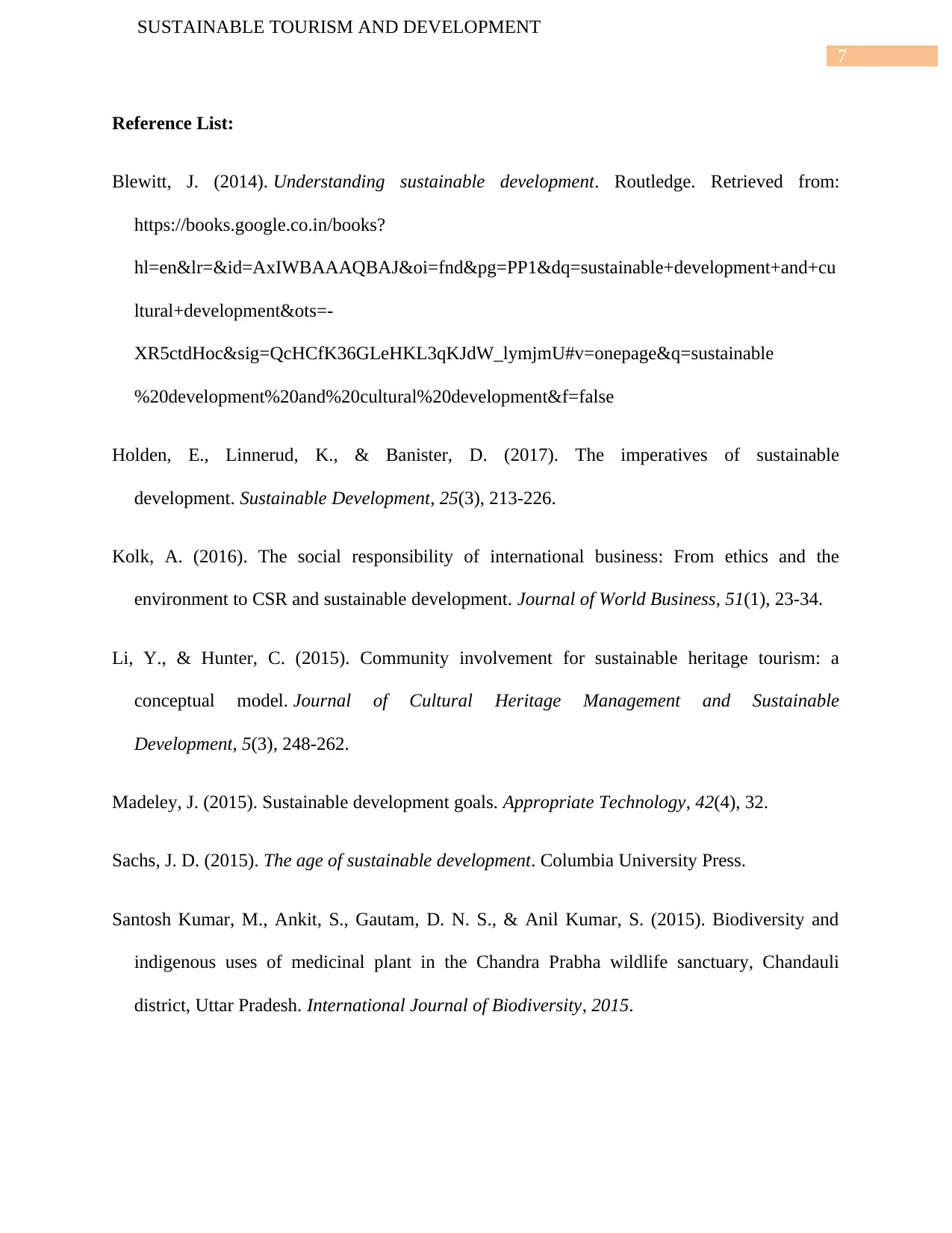
7
SUSTAINABLE TOURISM AND DEVELOPMENT
Reference List:
Blewitt, J. (2014). Understanding sustainable development. Routledge. Retrieved from:
https://books.google.co.in/books?
hl=en&lr=&id=AxIWBAAAQBAJ&oi=fnd&pg=PP1&dq=sustainable+development+and+cu
ltural+development&ots=-
XR5ctdHoc&sig=QcHCfK36GLeHKL3qKJdW_lymjmU#v=onepage&q=sustainable
%20development%20and%20cultural%20development&f=false
Holden, E., Linnerud, K., & Banister, D. (2017). The imperatives of sustainable
development. Sustainable Development, 25(3), 213-226.
Kolk, A. (2016). The social responsibility of international business: From ethics and the
environment to CSR and sustainable development. Journal of World Business, 51(1), 23-34.
Li, Y., & Hunter, C. (2015). Community involvement for sustainable heritage tourism: a
conceptual model. Journal of Cultural Heritage Management and Sustainable
Development, 5(3), 248-262.
Madeley, J. (2015). Sustainable development goals. Appropriate Technology, 42(4), 32.
Sachs, J. D. (2015). The age of sustainable development. Columbia University Press.
Santosh Kumar, M., Ankit, S., Gautam, D. N. S., & Anil Kumar, S. (2015). Biodiversity and
indigenous uses of medicinal plant in the Chandra Prabha wildlife sanctuary, Chandauli
district, Uttar Pradesh. International Journal of Biodiversity, 2015.
SUSTAINABLE TOURISM AND DEVELOPMENT
Reference List:
Blewitt, J. (2014). Understanding sustainable development. Routledge. Retrieved from:
https://books.google.co.in/books?
hl=en&lr=&id=AxIWBAAAQBAJ&oi=fnd&pg=PP1&dq=sustainable+development+and+cu
ltural+development&ots=-
XR5ctdHoc&sig=QcHCfK36GLeHKL3qKJdW_lymjmU#v=onepage&q=sustainable
%20development%20and%20cultural%20development&f=false
Holden, E., Linnerud, K., & Banister, D. (2017). The imperatives of sustainable
development. Sustainable Development, 25(3), 213-226.
Kolk, A. (2016). The social responsibility of international business: From ethics and the
environment to CSR and sustainable development. Journal of World Business, 51(1), 23-34.
Li, Y., & Hunter, C. (2015). Community involvement for sustainable heritage tourism: a
conceptual model. Journal of Cultural Heritage Management and Sustainable
Development, 5(3), 248-262.
Madeley, J. (2015). Sustainable development goals. Appropriate Technology, 42(4), 32.
Sachs, J. D. (2015). The age of sustainable development. Columbia University Press.
Santosh Kumar, M., Ankit, S., Gautam, D. N. S., & Anil Kumar, S. (2015). Biodiversity and
indigenous uses of medicinal plant in the Chandra Prabha wildlife sanctuary, Chandauli
district, Uttar Pradesh. International Journal of Biodiversity, 2015.
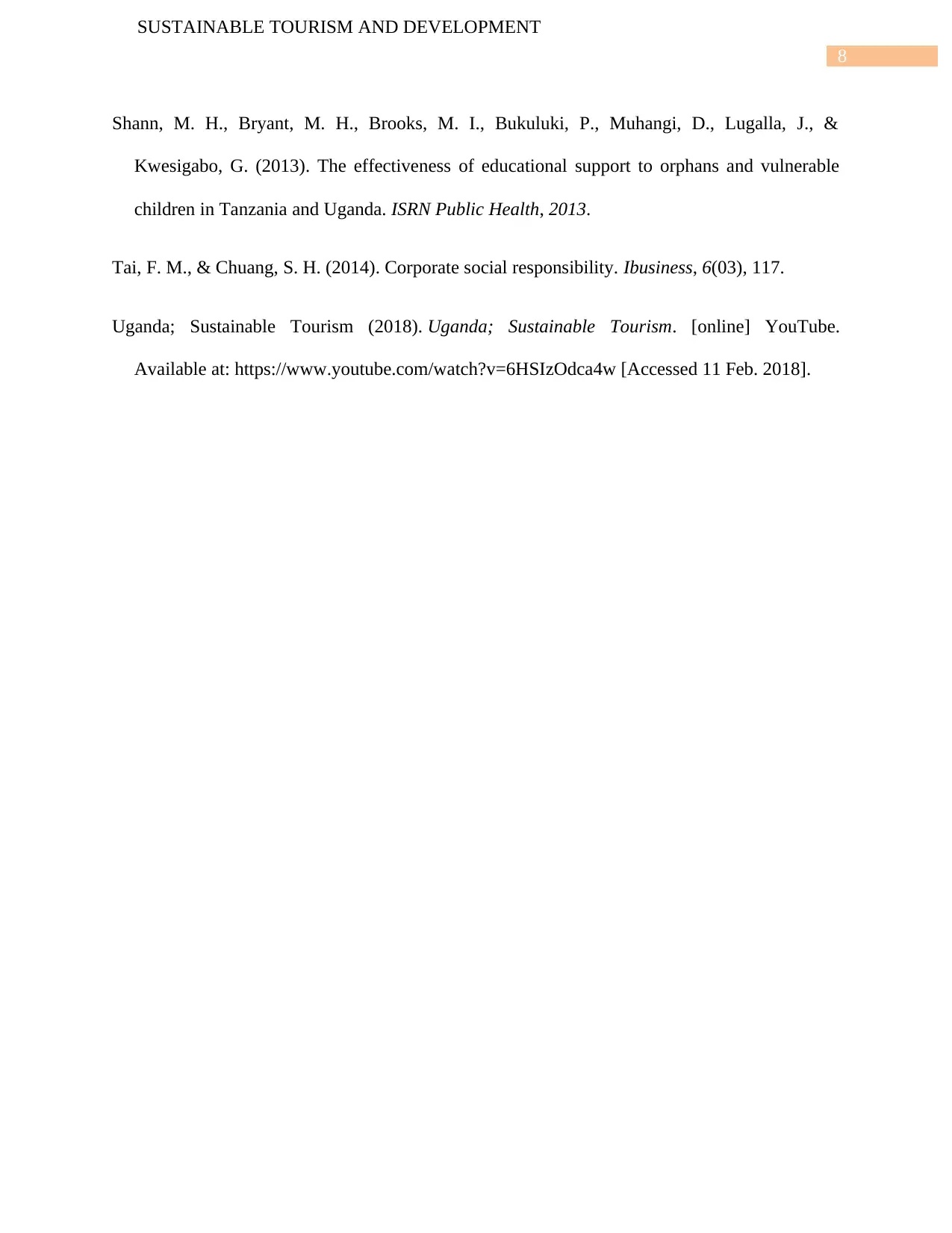
8
SUSTAINABLE TOURISM AND DEVELOPMENT
Shann, M. H., Bryant, M. H., Brooks, M. I., Bukuluki, P., Muhangi, D., Lugalla, J., &
Kwesigabo, G. (2013). The effectiveness of educational support to orphans and vulnerable
children in Tanzania and Uganda. ISRN Public Health, 2013.
Tai, F. M., & Chuang, S. H. (2014). Corporate social responsibility. Ibusiness, 6(03), 117.
Uganda; Sustainable Tourism (2018). Uganda; Sustainable Tourism. [online] YouTube.
Available at: https://www.youtube.com/watch?v=6HSIzOdca4w [Accessed 11 Feb. 2018].
SUSTAINABLE TOURISM AND DEVELOPMENT
Shann, M. H., Bryant, M. H., Brooks, M. I., Bukuluki, P., Muhangi, D., Lugalla, J., &
Kwesigabo, G. (2013). The effectiveness of educational support to orphans and vulnerable
children in Tanzania and Uganda. ISRN Public Health, 2013.
Tai, F. M., & Chuang, S. H. (2014). Corporate social responsibility. Ibusiness, 6(03), 117.
Uganda; Sustainable Tourism (2018). Uganda; Sustainable Tourism. [online] YouTube.
Available at: https://www.youtube.com/watch?v=6HSIzOdca4w [Accessed 11 Feb. 2018].
1 out of 9
Related Documents
Your All-in-One AI-Powered Toolkit for Academic Success.
+13062052269
info@desklib.com
Available 24*7 on WhatsApp / Email
![[object Object]](/_next/static/media/star-bottom.7253800d.svg)
Unlock your academic potential
© 2024 | Zucol Services PVT LTD | All rights reserved.




